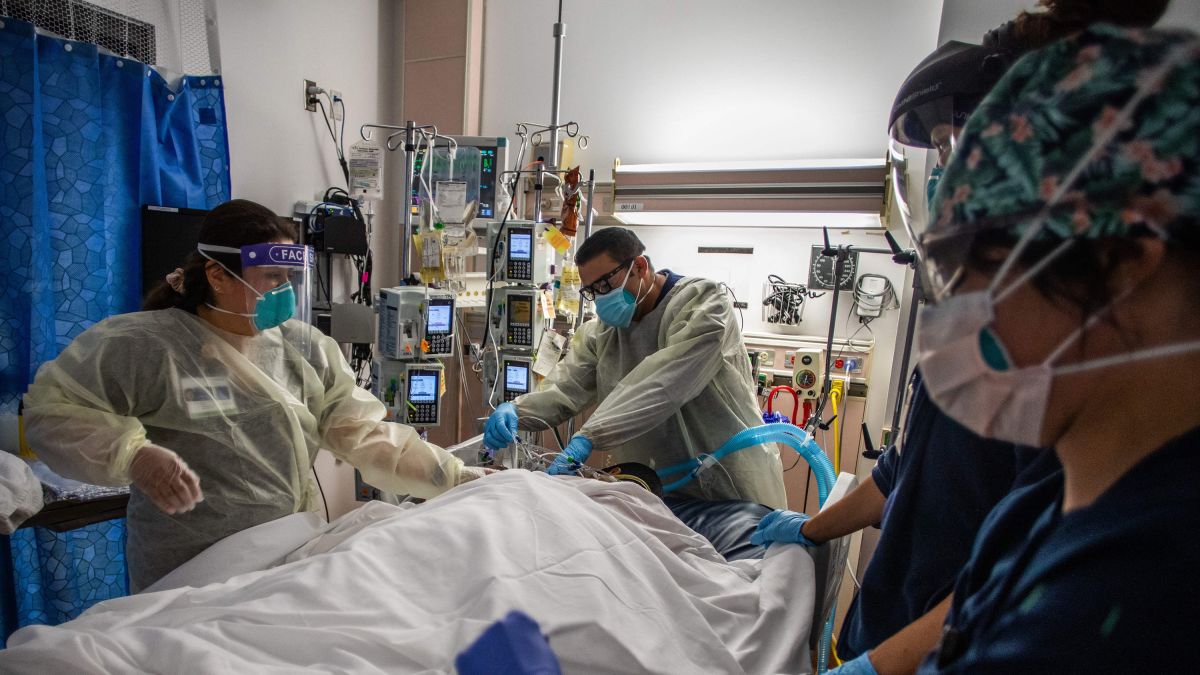This is how the full approval of the Pfizer vaccine could impact 0:58
(CNN) -
For fully vaccinated Americans, the risk of being hospitalized or dying from COVID-19 is low, much lower than the risk for unvaccinated people.
But in those rare cases where a fully vaccinated person becomes infected, the data suggests that older adults and those with multiple underlying medical conditions are most at risk for serious illness.
As of August 30, the U.S. Centers for Disease Control and Prevention (CDC) have received reports of 12,908 severe cases of covid-19 among fully vaccinated people that resulted in hospitalization or death. .
For the more than 173 million people who were fully vaccinated by that date, that represents less than a 1 in 13,000 chance of experiencing a severe case of COVID-19.
About 70% of postvaccination cases that resulted in hospitalization occurred among adults 65 years of age and older, and about 87% of postvaccination cases that resulted in death were among adults 65 years of age and older, CDC data suggests. .
These data are based on voluntary reports from the states and may be incomplete, but several studies suggest similar trends.
Unvaccinated adults in the United States are 17 times more likely to be hospitalized for COVID-19 than fully vaccinated adults, and hospitalized patients with a post-vaccination case tend to be older and more likely to have at least three medical conditions underlying, according to a preliminary study the CDC unveiled last week.
advertising
What you need to know before going to a soccer game or other sporting event, whether you are vaccinated or not
Among vaccinated adults with postvaccination cases that brought them to the hospital, the average age was 73 years, and about 71% had three or more underlying conditions, including diabetes, heart disease, autoimmune conditions, and others.
Hospitalized unvaccinated COVID-19 patients averaged 59 years old, and about 56% had three or more underlying conditions, the study found.
From late June to late July, a period when the delta variant accounted for at least half of all COVID-19 cases, unvaccinated adults in the US were roughly 10 times more likely to be hospitalized for covid-19 than fully vaccinated adults, according to material disclosed by the CDC.
Both overall and since delta has been the prevalent variant, the risk of hospitalization was higher for unvaccinated adults in all age groups, but the risk gap is especially large among adults under 50 years of age.
CDC analyzed 4,700 hospitalizations among adults between January 24 and July 24 through the Covid-19 Hospitalization Surveillance Network (COVID-NET), which tracks laboratory-confirmed virus-associated hospitalizations in 99 counties. out of 14 states, representing approximately 10% of the United States population.
The study has not yet been peer-reviewed or published.
The risk in people with comorbidities
Another study also found that older people with underlying conditions accounted for the most severe post-vaccination cases.
"Identifying who is most likely to develop severe COVID-19 disease after vaccination will be critical to ongoing efforts to mitigate the impact of these infections after vaccination," Professor Dr. Hyung Chun said in a statement. Yale Medical School associate of cardiology on a study his team published Tuesday.
"These cases are extremely rare, but they are becoming more frequent as variants emerge and more time passes since patients are vaccinated."
CDC expects increase in deaths from covid-19 in the US 3:24
Chun and his colleagues studied nearly 1,000 patients hospitalized for various causes between the end of March and July of this year, approximately 18% of whom had received at least one dose of the COVID-19 vaccine and approximately 6% of them. which were fully vaccinated.
Their research, which took place before the delta variant dominated cases in the United States, found that the average age of people with severe COVID-19 symptoms was 80, with more than half being overweight.
Most had cardiovascular disease, half had lung disease, and half had diabetes.
Half of the people in the study who tested positive for coronavirus had no symptoms of the infection and were in the hospital for another illness.
If you got sick with covid-19 while vaccinated, didn't the vaccine work?
"It is clear that vaccines are highly effective and without them we would be facing a much more deadly pandemic," said Chun.
"As effective as vaccines are, with emerging variants and increasing cases of post-vaccination infections, we must remain vigilant in taking measures such as indoor masking and physical distancing."
The demographics of those with severe COVID-19 cases are similar to those at risk of severe infection in general, Dr. Peter Hotez told CNN's Kate Bolduan on Wednesday.
"I think what happens is that vaccines may show a greater decrease in immunity over time in those (high-risk) populations and that may be the reason. That is why, for example, Israel, when it first announced its booster plan to give a third immunization, they focused more on the elderly, "said Hotez, a vaccinologist and dean of the National School of Tropical Medicine at the Baylor School of Medicine.
But in terms of curbing the epidemic, the focus must be on reaching the unvaccinated population, he said.
"For this delta variant, which is so communicable, we have to vaccinate between 85 and 90% of the total population. So we have to find a way to get to those strongholds," Hotez said.
CNN's Maggie Fox contributed to this report.

